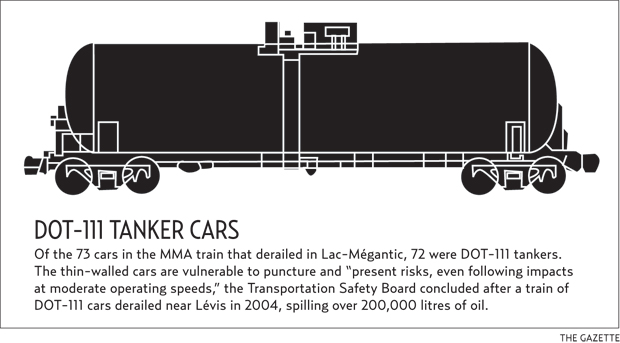The thin-walled DOT-111 cars are vulnerable to puncture and "present risks, even following impacts at moderate operating speeds," the Transportation Safety Board concluded.
Oil Industry Opposes RR Surcharge for Using Older Tank Cars
$1,000 charged for shipments in DOT-111 tank cars vs CPC-1232
Oil Group Fights BNSF Tank Car Surcharge At DC Circuit
By Linda Chiem
Law360, New York (April 6, 2017, 6:01 PM EDT) -- A petroleum industry group asked the D.C. Circuit on Wednesday to vacate the Surface Transportation Board's rejection of its complaint alleging BNSF Railway Co. improperly charged an unreasonable surcharge for crude oil shipped in older tank cars the railroad views as less safe than newer tank cars.
American Fuel & Petrochemical Manufacturers, a national trade association representing 400 petroleum refiners and petrochemical manufacturers, filed a petition for review with the federal appeals court challenging the Surface Transportation Board’s recent dismissal of its complaint challenging what it calls BNSF’s unlawful surcharge on DOT-111 tank cars carrying crude oil.
DOT-111 tank cars are sometimes known as legacy DOT-111 tank cars — they’re older, have thinner outer shells and are non-pressurized, and certain railroad industry stakeholders consider them to be less crash-resistant than newer, modernized tank cars. DOT-111 tank cars are still approved by the U.S. Department of Transportation’s Pipeline and Hazardous Materials Safety Administration to carry crude oil, but they must be retrofitted or phased out and replaced with a newer model of enhanced tank car over the next few years under stricter tank car standards the federal government issued in May 2015.
“DOT, not the railroads, is tasked by Congress to establish tank car standards, so BNSF is overstepping its authority by penalizing shippers of oil for using the federally authorized DOT-111 tank cars,” AFPM President and CEO Chet Thompson said in a statement Wednesday. “DOT has approved and deemed the cars safe for use, and a rail company can’t supplant the government’s decision.”
The group has balked at the per-carload rates BNSF has been charging since January 2015 for shipments in so-called unjacketed or general purpose DOT-111 tank cars — meaning certain tank cars that don’t have a thicker insulating jacket or shield around the car — that are about $1,000 higher than for shipments in jacketed DOT-111 tank cars, CPC-1232 tank cars, and Next Generation tank cars, according to court documents.
AFPM argued that, by implementing its new so-called price authority with a “flat-rate $1,000 differential” depending on the equipment used, BNSF enacted “an across-the-board penalty on the use of general purpose DOT-111 railcars in crude service.”
AFPM further argued that the $1,000 price differential is unreasonable and was implemented by BNSF to deter the use of unjacketed DOT-111 tank cars, even though such cars are still authorized for shipping crude oil under PHMSA safety regulations, according to court documents.
The retrofit deadlines for certain DOT-111 tank cars range from Jan. 1, 2018, for so-called unjacketed DOT-111 cars in Packing Group I service to May 1, 2023, for jacketed DOT-111 cars in Packing Group II service, according to PHMSA.
AFPM alleges that BNSF is essentially accelerating the clock on that PHMSA-approved retrofit schedule by slapping a surcharge on shipments using DOT-111 tank cars.
BNSF, meanwhile, has slammed AFPM’s complaint for being a rate challenge that fails to allege market dominance or otherwise meet the requirements of the rate reasonableness procedures that would warrant the STB to step in. The STB is the federal regulatory body that’s responsible for economic oversight of the nation's freight rail system and typically investigates rate disputes among shippers and the railroads that transport their goods.
The STB in February dismissed AFPM’s complaint, which was first filed in April 2016, saying AFPM had not provided reasonable grounds for investigating BNSF’s conduct as a violation of BNSF’s common carrier obligation.
“AFPM’s allegations concerning a common carrier violation do not support a claim,” the STB said in its decision made public on Feb. 8. “AFPM has challenged a published BNSF price authority, and thus does not argue that BNSF has refused to provide a rate.”
The AFPM is now asking the D.C. Circuit to set aside that STB decision, saying it was unlawful, arbitrary, capricious and an abuse of discretion. BNSF is not named as a respondent in the D.C. Circuit petition.
A spokesman for the STB said Thursday that the agency is aware of the petition and has no comment.
Representatives for BNSF were not immediately available for comment Thursday.
American Fuel & Petrochemical Manufacturers is represented by Justin A. Savage, Catherine E. Stetson and Sean M. Marotta of Hogan Lovells.
The STB is represented in-house by its office of general counsel and the U.S. Department of Justice.
BNSF is represented by Anthony J. LaRocca of Steptoe & Johnson LLP.
The case is American Fuel & Petrochemical Manufacturers v. Surface Transportation Board, case number 17-1112, in the U.S. Court of Appeals for the District of Columbia.
AFPM Challenges Decision on Tank Car Surcharge
WASHINGTON, April 5, 2017 /PRNewswire-USNewswire/ -- The American Fuel & Petrochemical Manufacturers (AFPM) filed a petition for review in the U.S. Court of Appeals for the D.C. Circuit, challenging the Surface Transportation Board's (STB) dismissal of its complaint against the unlawful surcharge imposed by BNSF Railway Company on DOT-111 tanks cars carrying crude oil.
The complaint, filed in April 2016, focused on BNSF's violation of its common carrier obligation and its attempt to alter the DOT-approved retrofit schedule through the imposition of a surcharge. BNSF's action is an improper collateral attack on tank car specifications established by the Department of Transportation (DOT) Pipeline and Hazardous Materials Safety Administration (PHMSA).
"DOT, not the railroads, is tasked by Congress to establish tank car standards, so BNSF is overstepping its authority by penalizing shippers of oil for using the federally authorized DOT-111 tank cars,” AFPM President and CEO Chet Thompson said. “DOT has approved and deemed the cars safe for use, and a rail company can't supplant the government's decision."
The STB characterized AFPM's complaint as a challenge to BNSF's base rate. This, AFPM said, despite PHMSA and BNSF publicly describing the premium on DOT-111s as a surcharge separate from BNSF's base rate, which the STB simply ignored.
"This surcharge harms our members and consumers, and there is little doubt that BNSF's intent is to usurp DOT's authority over tank car standards, something it should not be permitted to do," added Thompson.
Chicago Greens
Two Articles

